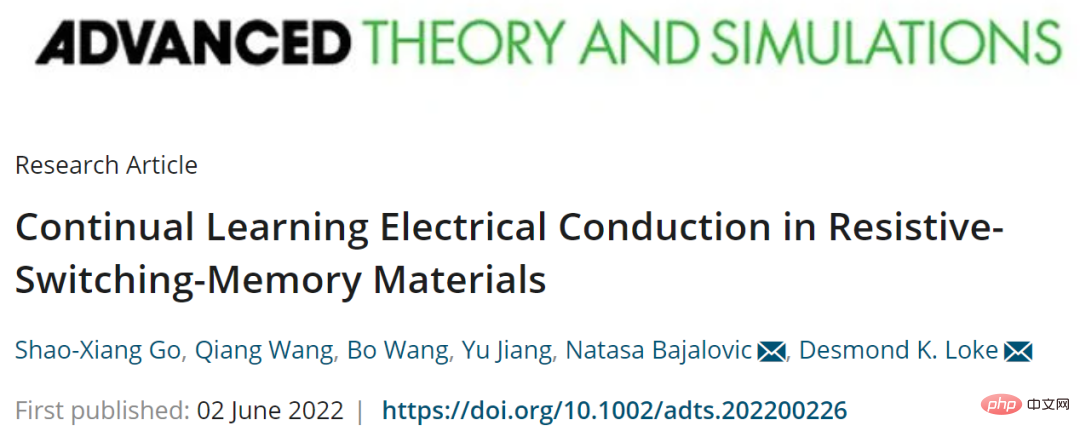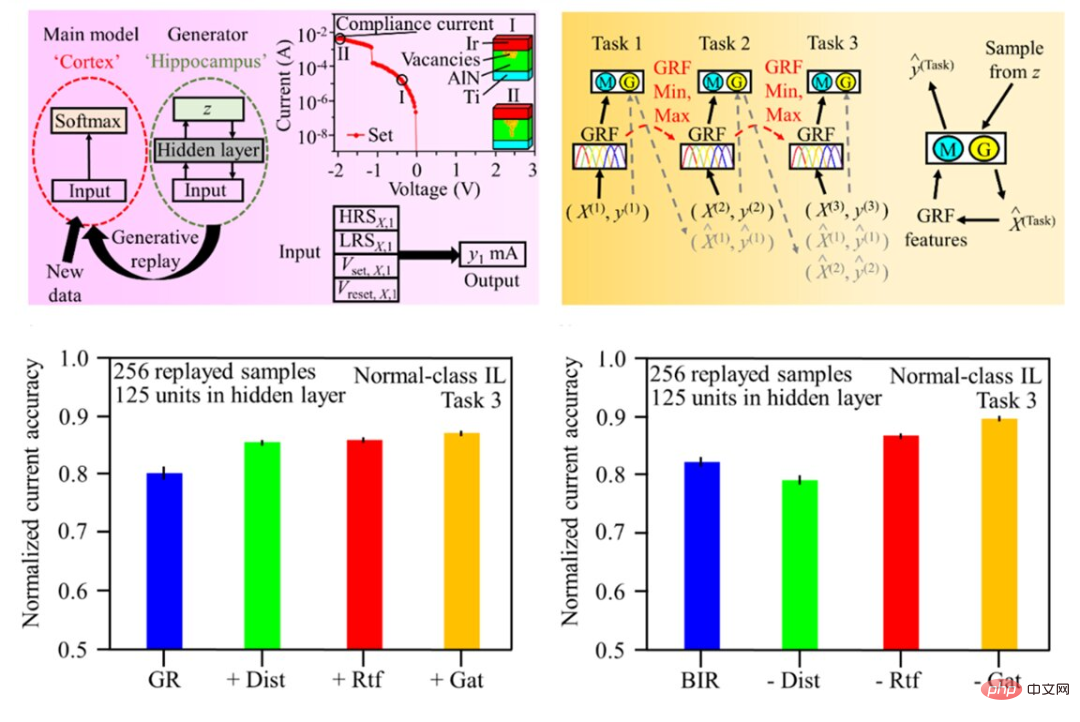 Technology peripherals
Technology peripherals
 AI
AI
 Simulating brain functions, this AI model truly achieves continuous learning like a human being
Simulating brain functions, this AI model truly achieves continuous learning like a human being
Simulating brain functions, this AI model truly achieves continuous learning like a human being
As breakthroughs in various AI fields such as image processing, smart healthcare, self-driving cars, and smart cities demonstrate, deep learning is undoubtedly experiencing a golden age. Over the next decade or so, AI and computer systems will finally have human-like learning and thinking capabilities to process a constant flow of information and interact with the real world.
However, current AI models suffer performance losses when continuously trained on new information. This is because whenever new data is generated, it is written on top of the existing data, erasing the previous information. This effect is called "catastrophic forgetting." The stability-plasticity dilemma results in the need for AI models to update their memory to continuously adapt to new information while maintaining the stability of current knowledge. This issue prevents SOTA AI models from continuously learning from real-world information.
Meanwhile, edge computing systems allow computing to be moved from cloud storage and data centers closer to the original source, such as devices connected to the Internet of Things. Efficiently applying continuous learning on resource-limited edge computing devices remains a challenge, although many continuous learning models have been proposed in the field to solve this problem. Traditional models require high computing power and large storage capacity.
Recently, a research team from the Singapore University of Technology and Design (SUTD) designed a new model that can achieve a highly energy-efficient continuous learning system, studying "Continual Learning Electrical Conduction in Resistive-Switching-Memory Materials" ” was published in the journal Advanced Theory and Simulation.

Paper address: https://onlinelibrary.wiley.com/doi/abs/10.1002/adts.202200226
The The team proposed a model inspired by the brain, Brain-Inspired Replay (BIR), which can naturally carry out continuous learning. The BIR model is based on artificial neural networks and variational autoencoders to simulate the functions of the human brain and performs well in incremental learning-like scenarios without stored data. Researchers have also used BIR models to represent the growth of conductive filaments using electric current in digital memory systems.
The upper left of the figure below shows the generative playback settings, the upper right shows the training of artificial neural network with generative playback; the lower left and lower right show the normalized current accuracy of the conventional and BIR models respectively.

Assistant Professor Loke, one of the corresponding authors of the paper, explained, “In BIR, knowledge is saved in the trained model, thereby introducing additional tasks. The performance loss is minimized at the same time, and there is no need to refer to data from previous work. Therefore, this approach can save a lot of energy."
He also added, "In the absence of stored data, Achieved 89% SOTA accuracy on the compliance challenge of current learning tasks, which is approximately two times higher than traditional continuous learning models, and achieves high energy efficiency."
In addition, in order To enable the BIR model to independently process real-world field information, the team plans to expand its tunability in the next phase of research.
Loke said the research is based on a small-scale demonstration and is still in its early stages. However, taking this approach promises to allow edge AI systems to develop independently without human control.
The above is the detailed content of Simulating brain functions, this AI model truly achieves continuous learning like a human being. For more information, please follow other related articles on the PHP Chinese website!

Hot AI Tools

Undresser.AI Undress
AI-powered app for creating realistic nude photos

AI Clothes Remover
Online AI tool for removing clothes from photos.

Undress AI Tool
Undress images for free

Clothoff.io
AI clothes remover

Video Face Swap
Swap faces in any video effortlessly with our completely free AI face swap tool!

Hot Article

Hot Tools

Notepad++7.3.1
Easy-to-use and free code editor

SublimeText3 Chinese version
Chinese version, very easy to use

Zend Studio 13.0.1
Powerful PHP integrated development environment

Dreamweaver CS6
Visual web development tools

SublimeText3 Mac version
God-level code editing software (SublimeText3)

Hot Topics
 What does cross-chain transaction mean? What are the cross-chain transactions?
Apr 21, 2025 pm 11:39 PM
What does cross-chain transaction mean? What are the cross-chain transactions?
Apr 21, 2025 pm 11:39 PM
Exchanges that support cross-chain transactions: 1. Binance, 2. Uniswap, 3. SushiSwap, 4. Curve Finance, 5. Thorchain, 6. 1inch Exchange, 7. DLN Trade, these platforms support multi-chain asset transactions through various technologies.
 WorldCoin (WLD) price forecast 2025-2031: Will WLD reach USD 4 by 2031?
Apr 21, 2025 pm 02:42 PM
WorldCoin (WLD) price forecast 2025-2031: Will WLD reach USD 4 by 2031?
Apr 21, 2025 pm 02:42 PM
WorldCoin (WLD) stands out in the cryptocurrency market with its unique biometric verification and privacy protection mechanisms, attracting the attention of many investors. WLD has performed outstandingly among altcoins with its innovative technologies, especially in combination with OpenAI artificial intelligence technology. But how will the digital assets behave in the next few years? Let's predict the future price of WLD together. The 2025 WLD price forecast is expected to achieve significant growth in WLD in 2025. Market analysis shows that the average WLD price may reach $1.31, with a maximum of $1.36. However, in a bear market, the price may fall to around $0.55. This growth expectation is mainly due to WorldCoin2.
 Web3 trading platform ranking_Web3 global exchanges top ten summary
Apr 21, 2025 am 10:45 AM
Web3 trading platform ranking_Web3 global exchanges top ten summary
Apr 21, 2025 am 10:45 AM
Binance is the overlord of the global digital asset trading ecosystem, and its characteristics include: 1. The average daily trading volume exceeds $150 billion, supports 500 trading pairs, covering 98% of mainstream currencies; 2. The innovation matrix covers the derivatives market, Web3 layout and education system; 3. The technical advantages are millisecond matching engines, with peak processing volumes of 1.4 million transactions per second; 4. Compliance progress holds 15-country licenses and establishes compliant entities in Europe and the United States.
 Why is the rise or fall of virtual currency prices? Why is the rise or fall of virtual currency prices?
Apr 21, 2025 am 08:57 AM
Why is the rise or fall of virtual currency prices? Why is the rise or fall of virtual currency prices?
Apr 21, 2025 am 08:57 AM
Factors of rising virtual currency prices include: 1. Increased market demand, 2. Decreased supply, 3. Stimulated positive news, 4. Optimistic market sentiment, 5. Macroeconomic environment; Decline factors include: 1. Decreased market demand, 2. Increased supply, 3. Strike of negative news, 4. Pessimistic market sentiment, 5. Macroeconomic environment.
 How to win KERNEL airdrop rewards on Binance Full process strategy
Apr 21, 2025 pm 01:03 PM
How to win KERNEL airdrop rewards on Binance Full process strategy
Apr 21, 2025 pm 01:03 PM
In the bustling world of cryptocurrencies, new opportunities always emerge. At present, KernelDAO (KERNEL) airdrop activity is attracting much attention and attracting the attention of many investors. So, what is the origin of this project? What benefits can BNB Holder get from it? Don't worry, the following will reveal it one by one for you.
 Ranking of leveraged exchanges in the currency circle The latest recommendations of the top ten leveraged exchanges in the currency circle
Apr 21, 2025 pm 11:24 PM
Ranking of leveraged exchanges in the currency circle The latest recommendations of the top ten leveraged exchanges in the currency circle
Apr 21, 2025 pm 11:24 PM
The platforms that have outstanding performance in leveraged trading, security and user experience in 2025 are: 1. OKX, suitable for high-frequency traders, providing up to 100 times leverage; 2. Binance, suitable for multi-currency traders around the world, providing 125 times high leverage; 3. Gate.io, suitable for professional derivatives players, providing 100 times leverage; 4. Bitget, suitable for novices and social traders, providing up to 100 times leverage; 5. Kraken, suitable for steady investors, providing 5 times leverage; 6. Bybit, suitable for altcoin explorers, providing 20 times leverage; 7. KuCoin, suitable for low-cost traders, providing 10 times leverage; 8. Bitfinex, suitable for senior play
 Aavenomics is a recommendation to modify the AAVE protocol token and introduce token repurchase, which has reached the quorum number of people.
Apr 21, 2025 pm 06:24 PM
Aavenomics is a recommendation to modify the AAVE protocol token and introduce token repurchase, which has reached the quorum number of people.
Apr 21, 2025 pm 06:24 PM
Aavenomics is a proposal to modify the AAVE protocol token and introduce token repos, which has implemented a quorum for AAVEDAO. Marc Zeller, founder of the AAVE Project Chain (ACI), announced this on X, noting that it marks a new era for the agreement. Marc Zeller, founder of the AAVE Chain Initiative (ACI), announced on X that the Aavenomics proposal includes modifying the AAVE protocol token and introducing token repos, has achieved a quorum for AAVEDAO. According to Zeller, this marks a new era for the agreement. AaveDao members voted overwhelmingly to support the proposal, which was 100 per week on Wednesday
 'Black Monday Sell' is a tough day for the cryptocurrency industry
Apr 21, 2025 pm 02:48 PM
'Black Monday Sell' is a tough day for the cryptocurrency industry
Apr 21, 2025 pm 02:48 PM
The plunge in the cryptocurrency market has caused panic among investors, and Dogecoin (Doge) has become one of the hardest hit areas. Its price fell sharply, and the total value lock-in of decentralized finance (DeFi) (TVL) also saw a significant decline. The selling wave of "Black Monday" swept the cryptocurrency market, and Dogecoin was the first to be hit. Its DeFiTVL fell to 2023 levels, and the currency price fell 23.78% in the past month. Dogecoin's DeFiTVL fell to a low of $2.72 million, mainly due to a 26.37% decline in the SOSO value index. Other major DeFi platforms, such as the boring Dao and Thorchain, TVL also dropped by 24.04% and 20, respectively.





